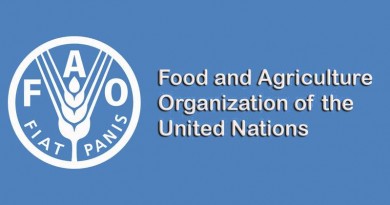Wildlife Conservation Society fit Elephants with GPS collars to reinforce ongoing protection efforts in Nigeria
The Wildlife Conservation Society (WCS) announced that it has fitted six elephants with GPS/satellite collars over the past two months to further reinforce ongoing protection efforts in Nigeria’s Yankari Game Reserve.
The collars are providing real-time tracking of elephant herds, allowing ranger teams to shadow the elephants at all times and alert the reserve manager whenever elephants are in danger or stray outside of the reserve.
Yankari Game Reserve in Bauchi State contains Nigeria’s largest elephant population, currently estimated at around 100. Since 2014 Yankari has been co-managed through a partnership agreement between WCS and Bauchi State Government, with funding support from Bauchi State, US Fish and Wildlife Service, Elephant Crisis Fund and the Wildlife Conservation Society. Thanks to focused law enforcement efforts and community engagement programs, no elephants have been documented killed in Yankari since 2015, bringing previously high poaching levels down to a very low level over the past four years, with zero poaching incidences detected.
As Nigeria’s human population grows ever bigger each day, previously intact world class wildlife and wild places are increasingly shrinking. Fortunately there are still some important natural areas left in the country, such as Yankari Game Reserve in Bauchi State, where animals such as elephants and lions can flourish, and where a viable tourism industry can provide employment opportunities and benefits to local communities surrounding the reserve.
Yankari contains the largest remaining savanna elephant population in the country and one of only two lion populations left in Nigeria. It has been managed through a co-management agreement between the Wildlife Conservation Society and Bauchi State Government since 2014, with funding support from Bauchi State, US Fish and Wildlife Service, Elephant Crisis Fund, the Lion Recovery Fund and Wildlife Conservation Society.
Once widespread across much of Nigeria including rainforest and savanna, elephants are now restricted to a few protected areas in the country. Elephants are threatened by habitat loss, human-elephant conflict and particularly by the illegal ivory trade. Elephants have been extensively persecuted in Nigeria for their ivory tusks for many years, highly-prized for traditional purposes and to supply the lucrative export market to Asia.
Yankari contains the largest savanna elephant population in the country, and one of the key critical populations remaining in the Sudano-Sahel Region.
Dr. Paul Elkan, Regional Director of WCS’s Sudano-Sahel Program, said:
“Real-time monitoring of elephant populations is essential for their protection by providing location data which is used to optimize deployment of anti-poaching and other wildlife protection interventions and also to help improve efforts to reduce elephant – human conflict with neighboring communities. At various protected area landscape sites across Africa where WCS is engaged in management partnerships with Governments and local communities, we have employed use of GPS/satellite collars, combined with ground based anti-poaching patrols, aerial monitoring, and real time law enforcement management to secure elephant populations. We use the collar tracking to help ensure the security of the elephants and movement data are used to plan landscape, park, and corridor management zoning and approaches. This is a great addition to our protection and management efforts in Yankari Game Reserve.”
Nachamada Geoffrey, WCS Landscape Director in Yankari Game Reserve and Resort Said:
“The satellite collars tell me where the elephants are at all times, so this is a really exciting new development for us. I can use this real-time information from the GPS/satellite collars to send ranger teams to exactly where the elephants are making sure they receive the maximum level of protection possible. The use of satellite collars has also allowed us to react more quickly whenever elephants stray outside the reserve, and has helped reduce levels of crop damage and human-elephant conflict. We manage the information on elephant locations with strict confidentiality to ensure their safety at all times.”
Chief veterinarian on the project Dr Richard Harvey said:
“The elephants were in good condition, with animals of various ages and plenty of juveniles and calves. The herd is reproducing well, which is great news for the future of elephants, and for the Yankari ecosystem overall.”
While progress in Yankari and other areas such as Cross River National Park is encouraging, with porous borders and weak enforcement, Nigeria has become a notorious center for the illegal trade in ivory to China and Vietnam transiting through Nigeria from other areas in Africa.
Nigeria also has a flourishing domestic trade in ivory, sold mainly to Chinese visitors, even though the export of ivory from Nigeria is strictly prohibited by the Government. The ivory market in Lagos is reputed to be the largest ivory market in Africa.
Dr. Chris Thouless, Director of the Elephant Crisis Fund and Strategic Advisor to Save the Elephants Said :
“We are proud to support WCS’s work in Yankari Game Reserve and the progress in securing this critical population is of regional conservation significance” “That said, we strongly urge the Government of Nigeria to close down the domestic trade in ivory as soon as possible and to ensure that trafficking of ivory through Nigeria from neighboring countries is completely halted.”




